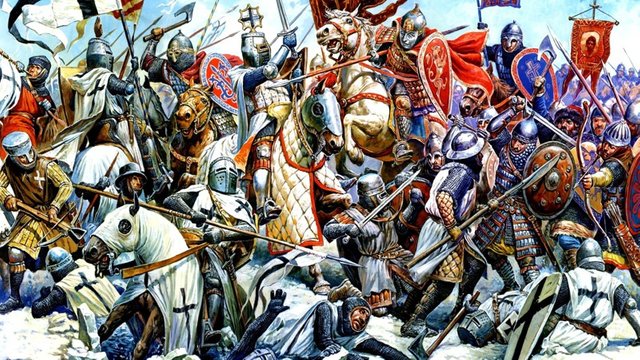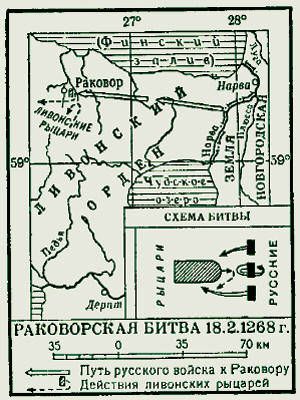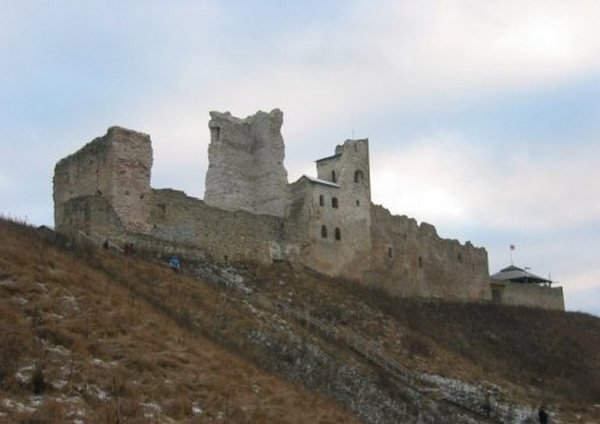On countering the expansion of the German knights, Swedes and Danes to the North-West of Russia we know mainly through the activities of the Novgorod Prince Alexander Nevsky and his victory over the Swedes on the Neva river in 1240 and over the Livonian knights at lake Peipus in 1242, in the battle known as the battle of the Ice. Indeed, thanks to these victories, the Prince managed to stop the progress of the Swedes and Livonians for some time, and against the backdrop of the invasion of the hordes of Batu Khan and destruction of almost all principalities by them, these victories were like a ray of sun on a gloomy day. Probably therefore they were so much praised by chroniclers that in their shadow there was one more battle between the Russian ratya and the United troops of the Livonian order, the Livonian Archbishop and so-called Danish Estonia near the city of Rakovor (Rakvere). But it was one of the largest battles in Europe in the XIII century. And although the outcome of this battle was not as spectacular as the defeat of the German knights on the ice of lake Peipus, but nevertheless he for many years determined the relationship of the Livonian order with Russia. But let's do it in order.
Prehistory.

In 1262 he died Prince of Novgorod, Alexander Yaroslavich Nevsky and Novgorod obeyed his brother, the Grand Duke Vladimir Yaroslav Yaroslavich. Who remained to reign in Vladimir, and in Novgorod planted his Deputy Prince Yuri Andreevich. In 1267, by order of his suzerain Yuri Andreevich began to prepare the squad for the campaign to Polotsk, which since the 40s of the XIII century has been controlled by Lithuania. But Lithuania after the death of Grand Duke Mindaugas is mired in strife and Yaroslav Yaroslavich believed that this is the right moment to recapture Polotsk back and spread your influence on him.
However, coming from Novgorod, the team suddenly began to refuse to go to Polotsk, and the magistrates began to persuade the Prince Yuri Andreevich to oppose a Danish Estonia and go to town Recover and revel. In order to take revenge on the Danes for the oppression of the Novgorod merchants.
There is a version that the oppression of merchants was a conscious provocation and Novgorod squad specifically lured into enemy territory to hit her with all his might, to defeat and open the way for the Livonian knights and Danes in Pskov and Novgorod. Whatever it was, but Novgorod moved Recover and tried to take it immediately. However, after losing several men killed, the army turned around and went back to Novgorod. The fact that the initial aim of the campaign the squad was completely different, and Novgorod was not going to storm an impregnable fortress. Accordingly, the siege weapons they had, and without them the walls Rakovor was nothing to do. Maybe a quick retreat and saved Novgorod squad, Livonians just couldn't so fast to pull the troops.
But Novgorod was not satisfied and began to prepare the next campaign in Livonia. Novgorod boyars convinced of the necessity of this campaign And Grand Duke Yaroslav Yaroslavich. In the midst of this preparation in Novgorod come ambassadors from the Riga Archbishop, who assert Novgorod about his interference in the case of the latter to the Danes. In response Novgorod sends its Ambassador to Riga, where the Riga Archbishop and the master of the Livonian Order pledge not to attack on Russia in case of war with the Danes.
23 Jan the year 1268 from Novgorod came a squad which in addition to Novgorod regiments under the command of Prince Yury Andreevich, were also princes of Vladimir land with their retinues: the sons of Grand Prince Yaroslav Yaroslav Svyatoslav and Mikhail of Tver squad, Dmitry Aleksandrovich of Pereyaslavl and Knyaz Dovmont Pskov with the squad. The Russian army invaded Livonia and the beginning of a systematic attack on Recover.
Battle.

On 18 February the year 1268 in the village of Maholm, on the banks of the river Pada, 20 km away from Rakovor the Russian team clashed with the forces Livonians. What was the surprise of the Russian princes, when before them appeared not only the army of the Danish king, but also the knights of the Livonian Order And Livonian bishops, who had previously swore that they would not participate in the clash of Russians with the Danes. The Livonian army, lined up in an "iron pig", a favorite tactic of the Livonian knights, marched on the Russian squad. The tip of the " RAM " were selected knights of the Order, on the left flank were the Danes, and on the right army of Livonian bishops and militia. Headed this 20-25 thousand army Bishop Alexander of Dorpat.
The brunt of knight's "pigs" took on himself in the center of the Novgorod regiments led by Prince Yuri Andreevich. The right flank was made by Pereyaslavsky squadron of Prince Dmitry Aleksandrovich and Pskov squadron of Prince Dovmont. And on the left flank there was the Tver squad of princes Yaroslavich. In total the Russian army counted from 16 to 30 thousand soldiers.
The Bishop's troops and the Livonian militia were the first to tremble and run, and the teams of Dovmont and Dmitry Alexandrovich rushed to pursue them. This time, however, the situation at the centre became critical, the Novgorod regiments faltered under the pressure of the knight of the wedge, began to panic. The situation was managed to level Prince Dmitry Alexandrovich, who quickly gathered part of his squad and hit the flank of the German knights. This allowed Novgorod regiments to regroup and continue the resistance. Soon broke and ran from the battlefield by the Danes. However, the situation in the centre continued to be difficult. Towards evening the Novgorod still broke and ran. Livonians managed to seize the Russian convoy, where they immediately destroyed all siege weapons designed to storm the walls of the Shell.
In the evening the Russian squad began to return after the pursuit of the broken enemy forces, but forces to attack the knights were gone. At the Council it was decided to launch an attack at dawn. But Livonians understanding that their situation became very dangerous, left a battlefield at night and left. Russian troops stood on the battlefield for another three days, began to return to Novgorod. After losing siege weapons attack on Recover has become meaningless. Only Prince Dovmont, who with his Pskov squadron of fire and sword walked on Pomorie, was delayed.
Overall results.

Victory in this battle each side attributed to itself. German chroniclers argued that because the capture of the knights of the Russian convoy and the destruction of siege weapons thwarted the plans of the Russians to capture Rakovor, the goal of the battle is achieved, and therefore the victory can be attributed to the Livonians. However, if you follow the classical formulations, then formally the winner is the one who left the battlefield, and it remained for the Russians.
And the loss of the Russian troops, though, were very high, they amounted to about 5 thousand people were killed, but still they could not compare with the loss of the Livonians. The United Livonian army lost half of its soldiers killed, 12 thousand people. In this battle, the color of Livonian chivalry. And although at the end of may of that year the Germans attacked Pskov, bringing under its walls a pretty huge army of 18 thousand people, but the bulk of it was not well-armed and battle-hardened knights, gathered from all lands and peasants militias. Therefore, when the Pskov reinforcements arrived from Novgorod, Livonians do not even have to engage him in battle, and retreated from the city and concluded with Prince Yuri Andreevich truce.
Livonian order was so weakened that in the near future simply could not carry out further expansion to the Russian and Lithuanian lands. And after lengthy negotiations between the Russians and Livonians, an armistice was concluded, which had been maintained for thirty years, until 1299.
From this we can conclude that unjustly forgotten Recoverthe battle played an equally important role in the history of Russia than the Ice of lake Peipus. And on its scale it was one of the largest battles in Europe in the XIII century.
Прошу разместить перевод на русском перед английским текстом. Таковы правила тега #slovo
Или уберите тег во избежание флага.
Downvoting a post can decrease pending rewards and make it less visible. Common reasons:
Submit